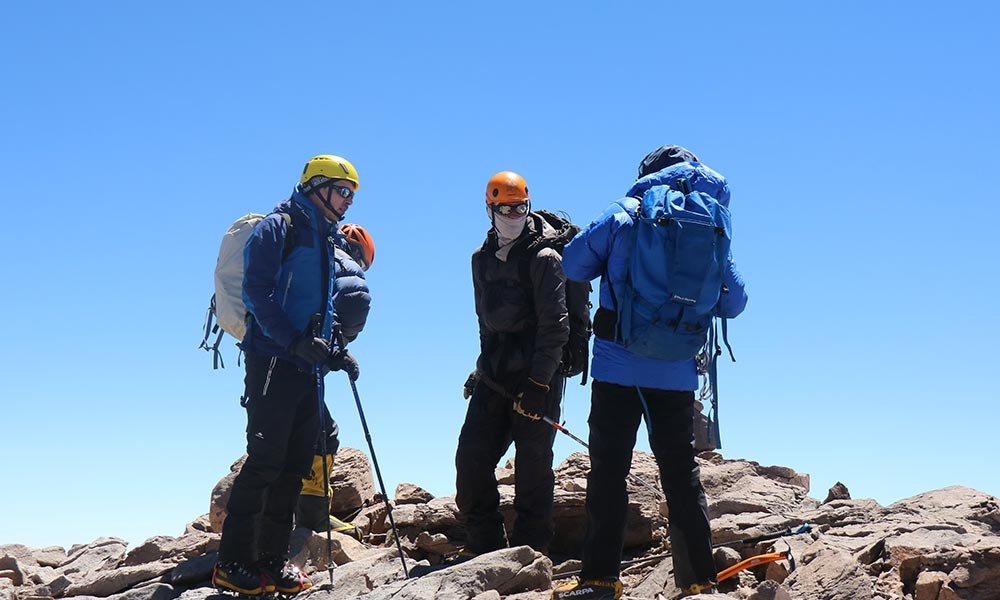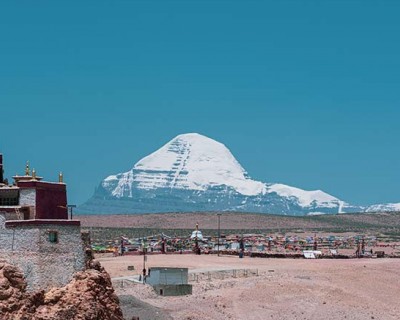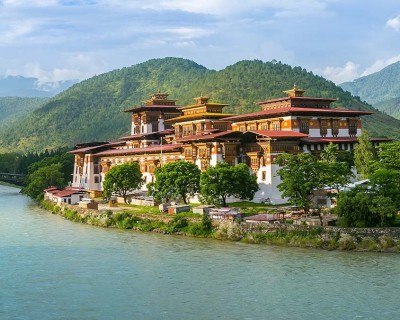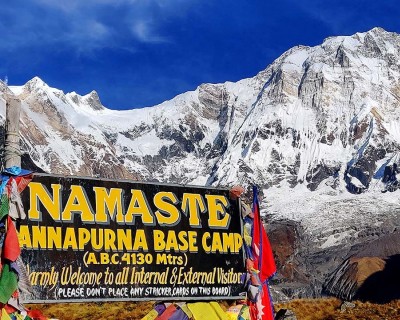Preparation For Everest Base Camp Trek
Physical Fitness Requirements
The Everest Base Camp Trek is a physically demanding trek, and trekkers must be fit and healthy to complete it without any physical trouble. This trek consists of uneven terrain, sloppy landscapes, and high altitude, which might not be an easy journey for all of us. So having great strength and energy is recommended before embarking on Everest Base Camp Trek.
Mental Requirements
You should be mentally prepared to go through and face any kinds of obstacles that may arise during your Everest Base Trek package. If you are determined to take on this risky trek and prepare accordingly, you will be successful with your plan.
Altitude Acclimatization
Trekkers should always appreciate the high altitude while they go on Everest Base Camp Trek. As you ascend to high altitudes, you might be more prone to altitude sickness and other illnesses. That's why you should acclimatize yourself to retain your energy level. Acclimatization day includes taking plenty of rest, drinking water, and avoiding any narcotics and alcoholic products.
Clothing and Gear Needs
Clothing and gears come under Everest Base Camp Trek Packing List. You will be in need of several items from warm thermal clothes to waterproof jackets and sturdy hiking boots. Similarly, other products like sleeping bags, trekking poles, and duffle bags are very essential during the trek.
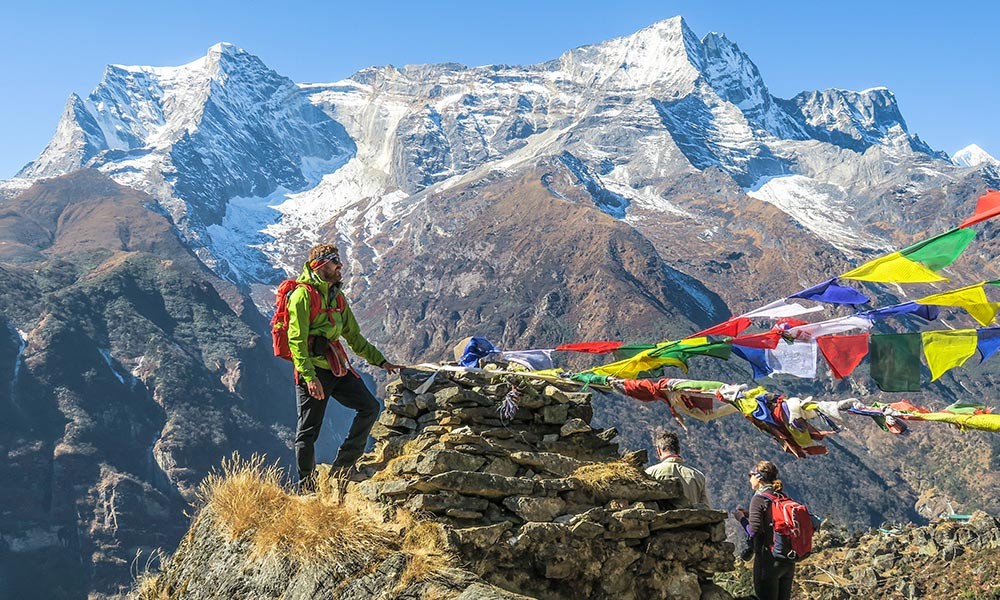
You might like to read EBC trek in Different Months of Spring: March | April | May and the Months of Autumn: September | October | November
Challenges Of EBC Trek | Safety and Security
Risk of altitude sickness
Everest Base Camp is at an altitude of 5,364 meters, so the risk of altitude sickness is wildly high. You will walk through treacherous landscapes where there is thin air and depleted oxygen. And people with illnesses like asthma are even more prone to such health hazards. Generally, the primary symptoms of altitude sickness are headache, nausea, dizziness, and fatigue.
Risk of natural disasters
The risk of natural disasters is high during the off-season trek; that's why a well-prepared plan and quality gear should always be on your Everest Base Camp Trek Packing List. As we all know, mountainous areas are posed by natural disasters like landslides and avalanches. During the monsoon, you might experience landslides blocking your route; during the winter, you might experience avalanches and heavy snowfalls.
Preparing for a safe trek
A well-prepared plan is always needed for a safe trek to EBC. Firstly, you should have quality gear and items you can rely on. The next thing is to acclimatize yourself and retain energy and stay hydrated. Moreover, you should avoid off-season treks to EBC to eliminate the possible dangers of natural calamities.
Also, you should always acknowledge the weather of the Everest region. For this, always listen to the weather forecast before starting your hike. Similarly, you can take oxygen cylinders to support breathing if you have any illness.
Everest Base Camp Trek Packing List
Everest Base Camp Trek Packing List is a setlist collection of gear, equipment, and other things you will require during the EBC trek. Your safety in high altitude is a very delicate thing to deal with; that's why you need to have every gear to be far from possible dangers. Some of the materials that come under the Everest Base Camp Trek packing list are as follows:
Clothing
Clothing is an essential thing during the high-altitude trek. The temperature around the Everest region is cold. That's why you must be more considerate regarding your clothing choice during the hike.
Outerwear:
Jacket: A waterproof and windproof jacket is essential for the high-altitude trek. Since Everest Base camp has a cold environment with harsh winds and sometimes rainfall, you should be prepared. So having outerwear like a windproof jacket is recommended.
Pants: Your trekking pants should be lightweight and waterproof. You will walk for over 6 hours daily throughout the trek, so donning heavy pants might be a problem. Opting for light windproof pants for the hike will make you comfortable since the products are friendly and flexible.
Hat: The sun might be powerful during the daytime. So, a wide-brimmed hat is essential to avoid sunburn or direct eye contact with the sun. You must choose a lightweight cap that is easy to carry.
Gloves: Keep warm gloves in the Everest Base Camp Trek packing list. These gloves must be lightweight, windproof, and waterproof; if they have thermal clothes inside, it would be much better. The main reason to have warm gloves is to keep your hands off the cold and eliminate the possible frostbite during the winter season.
Scarf: A lightweight scarf can be used to cover your face during windy days. Choose a fabric that is warm yet breathable.
Underclothing:
Tops: When it comes to the underclothing top outfits for Everest Base Camp, you should always pack lightweight tops that are comfortable to wear. We recommend you choose products made from fabrics.
Bottoms: Like the top inner clothes, bottom outfits should also be lightweight and comfortable so they don't become your problem during a long hike. Fabric clothes are considered best for this.
Socks: We all know that if your feet are warm, your body will be warm. So to keep your feet away from the harsh cold, you must have a pair of warm socks. Your socks should be lightweight and comfortable, making your feet dry and warm. You might go for the woolen socks for this option.
Footwear:
Hiking boots: A good pair of hiking boots is essential for the Everest Base Camp Trek. Choose ones that are waterproof, comfortable, and provide good ankle support.
Camp shoes: A pair of lightweight camp shoes is essential for taking breaks or camping overnight at base camp. Make sure to choose comfortable ones with a good grip on slippery surfaces.
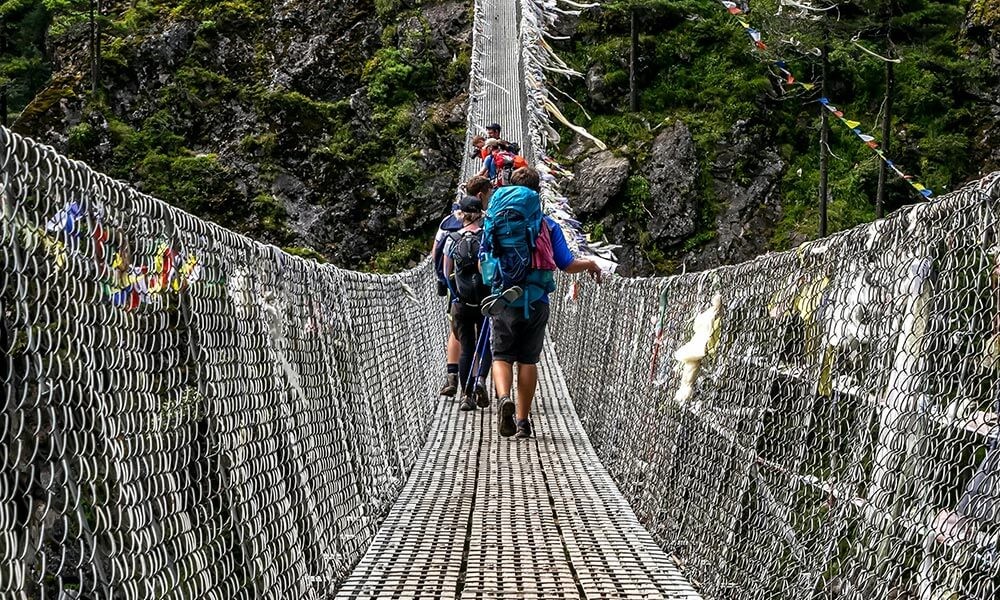
Gear
Backpack: With a backpack, you can take your essentials to bring all your needed items to the EBC Trek. That's why it is the essential gear under Everest Base Camp Trek Packing List. Your backpack should be large enough to fit all necessary equipment and supplies. But remember this you should be able to carry it by yourself or you can hire porters.
Sleeping bag: Sleeping bags are another essential item in the Everest Base Camp Trek Packing list. Without a suitable sleeping bag, your night will be hell in Everest Region. The region is always cold, so you must bring warm thermal sleeping bags that retain the heat and give you warmth during the night. If you want a relaxing night in the Everest region, you should probably bring this product designed for cold temperatures.
Choose a tent designed for camping in cold temperatures and high altitudes. Look for one with plenty of ventilation and a waterproof flysheet to keep you dry in wet weather conditions.
Water bottle: A good water bottle, essentially a thermos, is essential during high-altitude treks. The weather is cold and breezy during your Everest Base Trek, and you must walk for hours. So staying hydrated and warm is essential. A thermos can store the hot waters that are best for cold temperatures, and your plan to stay hydrated will not be messed up.
Trekking poles: Walking for 6 to 7 hours a day is a challenging job. Trekking poles are made to provide you with some support, and you will need this during your EBC Trek. They provide stability when walking on uneven terrain or steep landscapes.
Toiletries
When embarking on the Everest Base Camp Trek, one of the simplest things you might be missing to consider is toiletries. Around Namche Bazaar, you will experience the western latrine system, but you might have to deal with the squat toilets in the tea houses.
You must manage things by yourself and rinse your hands; a cold water tap is always there. But what after you reach the remote places? What are the alternatives? The answer is simple, be like a cat. Dig a hole, excrete, and bury your excretion in the soil - do not let your waste products hamper the surroundings. Here are some of the essential toiletries that should come in the Everest Base Camp Trek Packing List:
Toilet paper: In the remote region of EBC Trail, you will not find any forms of toilets and latrines. Also, there will not be a service of water taps to rinse off your hand. So, you must pack enough toilet paper since it is essential.
Hand sanitizer: Personal hygiene is essential to avoid health hazards during the hike. So, pack hand sanitizers during the trek and be clean. It will keep your hands clean while trekking in remote areas with limited access to running water.
Safety Gears
Safety is the first thing that anyone should prioritize during any hike. When it comes to the Everest base camp trek, safety will come above everything, even your daring adventures. Everest Base Camp Trek will lead you through some of the most treacherous landscapes in the world, from sloppy hills to glacial terrains. And most importantly, you will be hiking over 5000 meters above sea level, so your safety should always be at the top of everything.
First Aid Kit
You should always carry a first aid kit during EBC Trek - you might never know what happens to you or what kinds of injury you might go through since you will be walking through terrains.
The kit should know items like bandages, antiseptic wipes, and tweezers. Likewise, a kit should include a thermometer, blood pressure cuff, and adhesive tape for more severe injuries. It's also good to keep medications like ibuprofen or Benadryl in emergencies.
While using first aid-kits, use common sense and follow the instructions. One wrong move can have severe and life-threatening consequences. Trekkers should know precisely what they do while using a first aid kit. Also, remember to keep the first and clean from dust and dirt. Clean and restock supplies like gauze and antibiotics for further use and prevent infection or contamination.
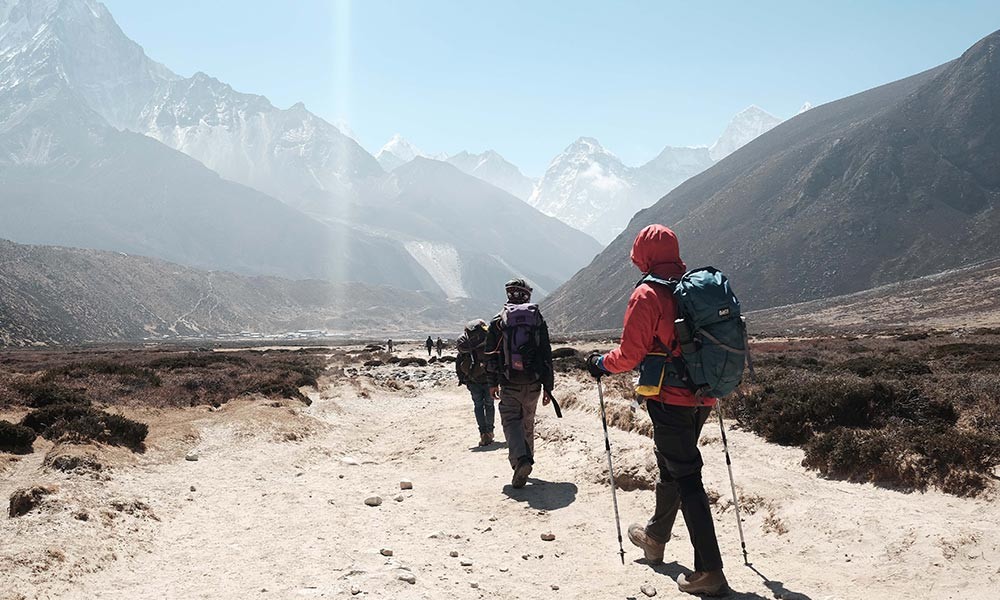
Miscellaneous
Maps and Guide Books
Maps and guide goods are valuable for anyone who enjoys trekking as a hobby or job. It provides an overview of the terrain allowing for a quick region reference. They likewise help to identify all the routes and other landmarks along the way. This insight can be vital in finding interesting detours and ways to alter the journey. A map's level of detail feature helps search areas and prepare an approach while trekking. Different types of maps for other regions are available. They all contain detailed info about the area's terrains. They further provide information about elevation, resources, and primary and secondary routes. Trekkers can quickly get the necessary information with the correct map before heading over an unknown region.
Head Lamps
The use of a headlamp while trekking has many benefits, which makes this equipment an important piece while trekking. It provides artificial light during night treks, allowing hikers to find their way. While traveling, the darkness makes it difficult to find the path for most trekkers at nighttime. Thus, lack of proper light will cause trekkers to lose a quick way, leading to a longer route than usual.
Carrying a headlamp solves all these problems and guides the path of the trekkers with a direct light source. Headlamps are light and easy to carry, making them a high utility piece while trekking. Many of these can be easily adjustable, allowing trekkers to control the brightness and distance of the light source. With adjustable headlamps, hikes can easily adjust the brightness at night.
The headlamp's versatility is wider than finding paths at night. They can also be used in emergencies or to light up campsites without natural light.
Binoculars
Binoculars is a tool mainly used for spotting and watching animals, the Himalayas, and getting the vistas of landscapes. Using binoculars can help make trekking safer and, of course, more enjoyable.
One of the most important things while trekking is staying safe. Binoculars can help you stay safe in a few different ways. If you are trekking in dangerous terrain, it can help you examine the terrain's condition from afar. It will help you to identify possible hazards like hidden crevices or unstable rocks, allowing you to plan your steps more carefully. At the same time, binoculars help you appreciate the nature and beauty of the region you travel to. It will help you with any vista, whether the moonlight on snow-capped mountains or the far-off migrating birds
Camera
Imagining a life without a camera has become impossible In the modern world. Technology has gifted us with a helpful companion —the Camera. Today, cameras are vital when it comes to trekking. Whether one seeks to explore the African Savannah or Everest peak, it is a must-have item.
Not only do they help capture the views, but they also fascinate and charm the locals one meets along the way. The Camera is an irreplaceable friend to the modern traveler despite its use for practical or purely aesthetic purposes. Likewise, this tool helps document one's journey, making the trek more meaningful and memorable.
Conclusion
Overall, it is to carefully consider the Everest Base Camp Trek packing list so you can get all the items needed throughout the trek. Packing the right gear and products will always make it comfortable and convenient to travel through EBC. Before all that, you should know what equipment is essential for this hike and you can plan accordingly.
We have listed many items under the Everest base camp trek packing list, including footwear, clothing, backpacks, toiletries, and many others, which might be very insightful for the trekkers. Always be safe while you travel to a remote place because you will be unknown about the climate, route, and environment during your first trip.
That said, there are always tips to make the most of the Everest Base Camp Trek. Having proper gear and traveling with a group will be suitable for anyone. Make sure you have packed lightweight materials that are easy to carry, and choose the best hiking season. Always have a plan B, so you don't need to worry if things don't go as expected. On top of that, stay hydrated and acclimatize yourself, and the rest will be taken care of. The beauty of Everest Base Camp is always waiting for your visit.
Related Blogs: Hire Guide for Everest Base Camp Trek | Everest Base Camp Trek 7 Days | Everest Base Camp Trek Preparation
